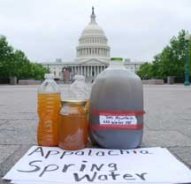Water Quality
Rally at EPA focuses on the value of clean water
KFTC members were among the crowd that rallied Wednesday in front of the U.S. Environmental Protection Agency headquarters in Washington, DC, calling for an end to mountaintop removal and protection of the region’s water.
Residents of Central Appalachian states brought with them more than 100 gallons of brown, black and red water that have been collected from water sources in Virginia, West Virginia and Kentucky.
“Sometimes the water runs orange, and you wouldn't want to touch it, much less drink it. But what’s more dangerous is when toxic water from your tap looks and smells totally fine. People sometimes drink it for years without knowing that they’re drinking toxic water and that’s what’s making them sick,” said Josh May of Magoffin County, a member of STAY (Stay Together Appalachian Youth) and KFTC. “We are bringing this water to the EPA as a way of holding them accountable. We’re having them sign for it so that they can formally acknowledge the problems that we’re living with everyday in the mountains."
Week in Washington starts with demand for conductivity rule
KFTC members were part of a multi-state delegation that formally petitioned the U.S. Environmental Protection Agency to begin a rule-making process to limit conductivity in the nation’s streams.
The petition was delivered to EPA officials in Washington, DC on Monday. The delegation was in the nation’s capital city as part of the annual Week in Washington, coordinated by the Alliance for Appalachia.
A formal petition was used because the EPA is required to respond. Central Appalachia residents have been asking EPA to begin the rule-making process since a federal court ruled last year that the agency’s conductivity “guidance” was not enforceable.
Some lawmakers question selenium regulation
Some lawmakers believe the Cabinet for Energy and Environment deliberately tried to confuse them about a controversial new regulation governing how much selenium can be discharged into Kentucky streams by mining operations.
Review of research adds support for moratorium on mountaintop removal
Two media events Tuesday helped focus attention on the Appalachian Community Health Emergency Act, legislation in Congress that would place an immediate moratorium on new permits while the health impacts of mountaintop removal mining are studied.
Known as the ACHE Act, H.R. 526 was introduced earlier this year by Reps. John Yarmuth of Kentucky and Louise Slaughter of New York, who was born in Harlan County, Kentucky.
“I’ve talked to citizens in the area – towns were 25 percent of the people suffer from some kind of disease, way beyond the national average,” said Yarmuth in an afternoon Congressional briefing. “I’ve talked with teachers whose students color creeks orange.
Appeals Court agrees: permit used to bury streams with mining wastes not valid
The U.S. Court of Appeals for the Sixth Circuit today invalidated the 2007 version of the nationwide permit used by the U.S. Army Corps of Engineers to authorize the dumping of coal mining wastes into hundreds of miles of Appalachian headwater streams.
The Corps had justified the using the National Permit (NWP 21) based on the "irrational" claim that burying streams with toxic mining wastes had no significant environmental impact.
“I’m thrilled they overturned this decision; it’s a victory for people in eastern Kentucky," said KFTC member Rick Handshoe, a party in the case whose family land in Floyd County is surrounded by mining. "People who live in eastern Kentucky deal with both the immediate and long-term cumulative impacts of mining everyday. Even when the mining is stopped and the coal company is long gone, we deal with the poisoned water and devastated land for decades afterwards.”
Page
- Home
- |
- Sitemap
- |
- Get Involved
- |
- Privacy Policy
- |
- Press
- |
- About
- |
- Bill Tracker
- |
- Contact
- |
- Links
- |
- RSS




